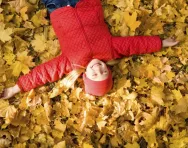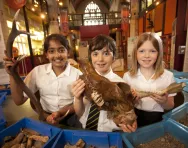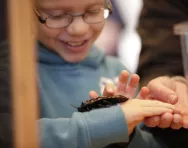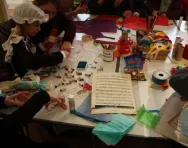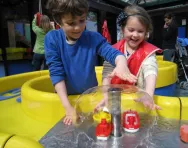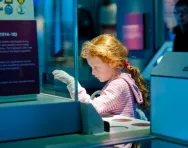Holiday learning in theme parks, museums and on the move
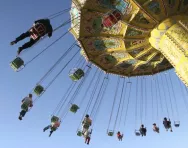
Most educators now believe that some of the most successful learning can happen in real-life situations. So, while you might be concerned that holidays (especially the long, long stretch of the summer holidays!) could see your child’s education heading in a backwards direction, in fact, with a little thought, the opposite could actually be true.
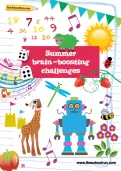
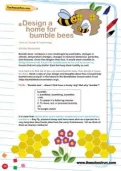
Claim A FREE Summer Brain-Boosting Challenges Pack!
- 30 exciting challenges
- Weird and wonderful facts
- Keep them busy the whole summer holiday!
Here are some suggestions for making the most of holidays and day trips, wherever you're heading.
Learning at the beach
Children of all ages (make that people of all ages!) seem to instinctively love the beach. It’s easy to see why. With the expanse of sand or pebbles (beautifully natural, malleable materials) and the water to play with and in, what could be more fun?
There’s a wealth of learning opportunities on the shore.
Our favourite is rock pooling – it’s fantastic, especially if you’ve consulted a non-fiction book (grab one from the library) to find out the names of all your catches. Depending on the age of the child they could draw pictures and diagrams of what they found, with fact boxes next to them. Older children might like to study the rocks themselves, and comment on them in terms of colour, marks and possible age. They might also like to prepare a poster advertising the concept of rock-pooling, using persuasive langauge to 'sell' the appeal of finding your own treasures to other beach-goers!
Another activity that’s brimming with learning opportunities is sandcastle building. Here younger children can be encouraged to continue patterns using various shells and stones – a great numeracy activity. Older children can experiment with more complex patterns and design, perhaps using symmetry and tessellation (shapes fitting together).
Learning in museums
“Museum? Bor-ring”. I hope it’s not just my children who say that! The key is to follow their interests and only go to exhibitions they’re going to really enjoy, otherwise you’ll put them off for life! So be it dinosaurs or Egyptians, find out what is where in your local area (and so much of it is free, too!). It's also worth looking through TheSchoolRun's museum reviews, written by parents for parents.
If they’ve been studying a historical theme at school, ask the teacher if you could see some planning or just a bullet-pointed list of what they’ve covered – even a look at their work should help. That way you’ll have some guidance on what to specifically look for that they’ll be able to relate to their school work.
Before you go, look at the museum's website – lots have an education area with downloadable teachers' materials (also perfect for parents), activity trails and child-focused exhibit guides. New technology means that going to a museum is going to becoming an ever more interactive activity: some museums even offer virtual reality experiences.
If you're planning a museum visit, ask your child to prepare a bullet-pointed list of things they want to see and discover before they go – that way they can check them off once they’re there. On their return encourage them to write their own guide for the exhibition, explaining artifacts and historical information.
Parent tip: For cheap deals on museum tickets (and other educational activities) try apps like Lovetovisit.com. It's a quick and handy way to plan your next learning adventure and there's plenty of free stuff to do as well.
Learning on the move
Long journeys can be the worse thing about holidays. But if you’re armed with some fun educational games it can make all the difference. Look through our list of learning games for long car journeys, or try:
- Speed adding using the numbers on number plates (great mental Maths!) Also try speed subtraction and multiplication for older children.
- 'I spy', but invent new rules to keep it interesting (for example, only items found in nature, or only man-made products). You could also practise words containing more complex phonemes like ‘igh’ or a split digraph.
- The Post-it Game: Write the name of someone famous on a sticky note and stick it to a player's forehead. They have to think up questions and discover who they are. Make it more educational by limiting the celebrities to historical or important figures.
- Music syllables: Listening to a song, as your child to count as many syllables as they can (a tally chart will help them keep track!).
- Complete the number sequence: Establish a number pattern (for example, +7 or consecutive tens) and ask your child to complete the sequence after figuring out the pattern. For example: 6, 9, 12 or 50, 55, 60, 65 or 12, 20, 28, 36. If they get it right they get a treat or to choose the next song in the car.
Learning in theme parks
Not the obvious place for a learning experience – but there’s actually plenty of learning to be had at a theme park in amongst the rollercoasters. Try these three ideas for starters:
- Money is the perfect real-life resource to practise numeracy skills with. Give each child a budget that they have to stick to for the day. That way they’ll be subtracting, adding and dividing – making sure they have enough for their chosen (tacky!) items.
- Guess the queue time! Who doesn't hate queues? Make them slightly less horrific by all guessing how long it’ll take to get to the front; then they can work out, through subtraction, who was closest.
- Putting various things into categories and sub-categories is an important part of both Science and Maths. Ask your child to categorise the rides in various ways. They can then record how many of each type of ride there is in the park in a chart (carry a notebook and pen for queue-time).
Learning in zoos and farms
Most zoos have comprehensive websites where your child can read about conservation efforts, animal habitats and more. Afer your visit, have your child write a non-fiction book about zoo life as a souvenir (and an excellent writing practice activity!). Remind them to include an engaging title and front cover, a contents page, interesting pictures and diagrams throughout, a glossary of words and terms and an index.
On a farm children can learn about animal care, and there are plenty of other educational opportunities too, including:
- Animal data: Working with your child, count how many of each animal there are, then use the opportunity to present the data in bar charts. Older children could prepare pie charts showing the percentage of sheep, pigs, cows, etc.
- Count the legs: Get your child practising their 2 and 4 times tables by counting the legs of a flock of sheep or a brood of chickens.
- Interview prep: Ask your child to write out some questions they want to ask staff on the farm, remembering capital letters and question marks. Older children can turn any Q&A sessions into a news-reporting experience and take notes, then write up the replies to their questions using speech marks.

Give your child a headstart
- FREE articles & expert information
- FREE resources & activities
- FREE homework help
